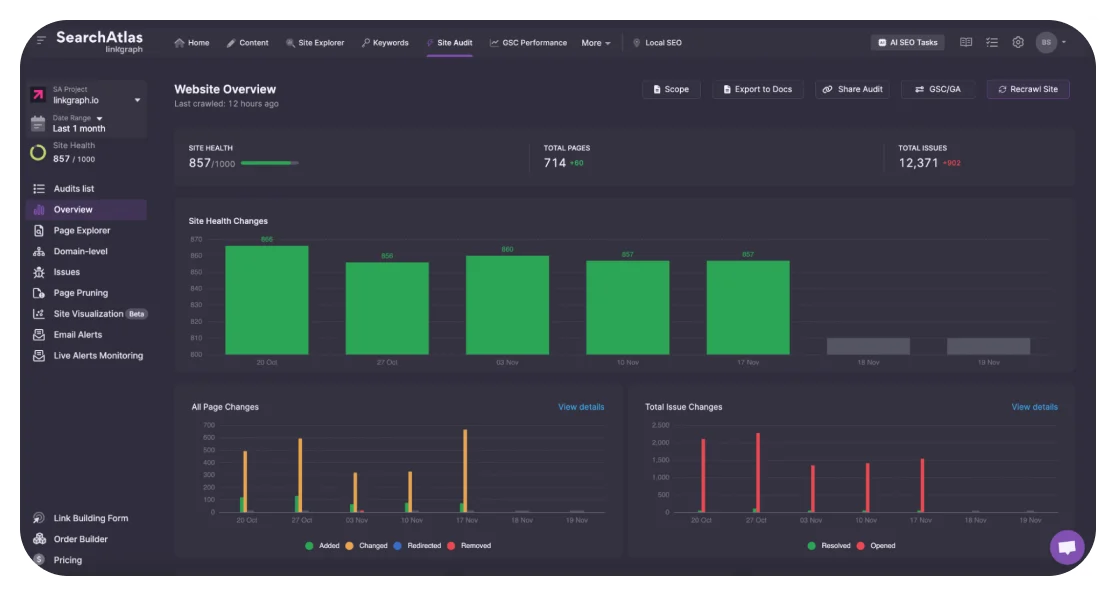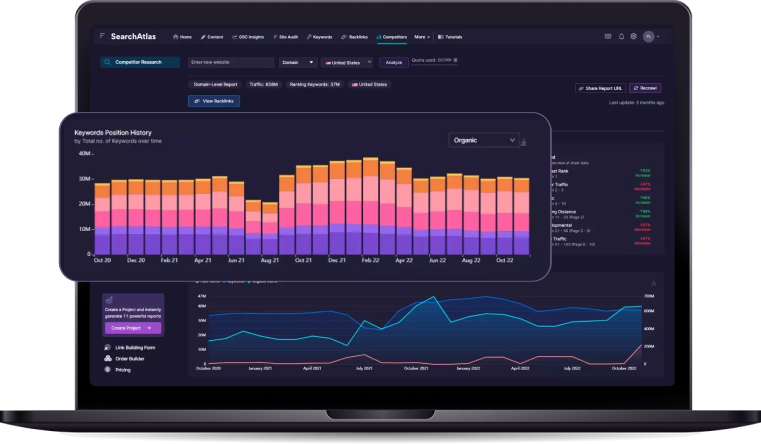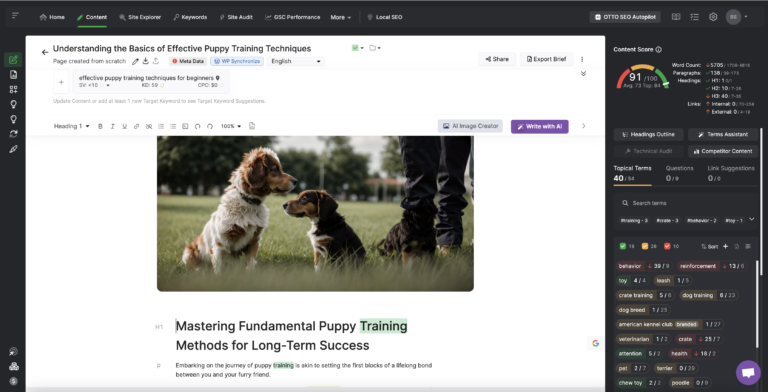Guide to Initial Keyword Research for SEO Beginners
Embarking on the journey of Search Engine Optimization can be likened to unlocking a treasure trove of visibility for your web page.
At the heart of this quest lies the art of keyword research, a strategic process that, when mastered, can elevate your content’s relevance and amplify its reach across the digital landscape.
For those new to SEO, deciphering the intricacies of keyword research is the cornerstone of a solid foundation, guiding your content strategy from obscurity to spotlight.
By identifying the right terms, assessing their utility, and meticulously incorporating them, beginners can construct a pathway to SEO success.
Keep reading to unravel the steps to adeptly navigate this crucial phase in the SEO odyssey.
Key Takeaways
- Keyword Research Is Essential for Aligning Content With User Search Intent and Enhancing Online Visibility
- SearchAtlas’s Keyword Researcher Tool Offers Beginners Valuable Insights Into Keyword Opportunities for SEO Success
- Mastering Keyword Research Involves Understanding Search Volume, Competition, and Keyword Intent to Connect With Target Audiences
- Creating an SEO Roadmap and Monitoring Keyword Performance Are Crucial for a Dynamic, Effective SEO Strategy
- Continuous Learning and Adaptation Are Necessary to Maintain Relevance and Competitiveness in the Evolving Digital Landscape
Understanding the Basics of Keyword Research

Keyword research stands at the forefront of SEO and digital marketing, serving as the strategic foundation upon which all successful campaigns are built.
It involves the identification and analysis of words and phrases that individuals use to search for information online.
This initial step is pivotal for businesses aiming to enhance their online presence and connect with their target market effectively.
Furthermore, a strong grasp of keyword research can illuminate the intent behind searches, thereby aligning web content with user needs.
Unpacking the complexity of SEO terminology is essential for novices venturing into this digital realm, enabling a clear understanding of how keywords can drive traffic, build brand awareness, and foster customer engagement.
Defining Keyword Research in SEO
At its core, keyword research is a strategic SEO process that involves identifying the terms and phrases that potential customers are typing into search engines.
It not only informs the content strategy but also aids in shaping the web design, URL structure optimization, and link building efforts to enhance visibility on the search engine results page:
- Content strategy pivots on understanding keyword relevance and integrating those keywords naturally into high-quality, engaging content.
- Web design meshes with SEO by incorporating keyword-rich metadata and optimizing elements like headings and images for improved information retrieval.
- Link building leverages keyword insights to create valuable backlinks with relevant anchor text, boosting a page’s trustworthiness and relevance in the eyes of search engines.
This methodical approach allows marketers to prioritize keyword opportunities based on factors like search volume, competition, and relevance to the brand.
The Role of Keywords in Digital Marketing
Keywords serve as the fundamental connectors between a brand and its target audience within the digital marketing ecosystem. They act as benchmarks for content creation, ensuring that every blog post, social media update, and email marketing campaign resonates with the specific interests and queries of potential customers.
Recognizing the power of keywords transforms marketing automation and analytics from mere tools into sharp instruments of insight and intelligence. This targeted approach helps marketers craft strategies that not only achieve high rankings on search engine results pages but significantly improve return on investment by aligning with consumer behavior and intent.
Breaking Down SEO Jargon for Beginners
Grasping the vernacular of SEO can be daunting for newcomers, yet mastering the language of keyword research is key to unlocking the potential of digital marketing. A beginner’s technical SEO guide becomes an invaluable resource, clarifying terms like ‘seed keywords’, ‘keyword density’, and ‘long-tail’ keywords, which are the building blocks of a nuanced content strategy.
Keyword density, for instance, gauges the frequency of a keyword phrase within a web page, providing a quantitative insight into content optimization. Beginners learn to sidestep pitfalls such as keyword stuffing, embracing instead the art of achieving natural text optimization to boost organic search results authentically.
How to Identify Your Initial Keywords

Kickstarting a venture into the SEO realm begins with a solid foundation in keyword research—a task that seems daunting but is simplified through informed strategy.
The process starts with brainstorming session, pinpointing core business terms that epitomize the scope and focus of one’s brand.
Recognizing the value of seed keywords, the fundamental elements of any keyword list, paves the way for a structured approach toward uncovering a spectrum of relevant phrases.
Equipped with the right tools, digital marketers can effortlessly generate a robust keyword list, signaling the initial step toward a strategic content campaign tailored to their target audience.
Brainstorming Your Core Business Terms
Launching an effective keyword research campaign begins with a strategic brainstorming process: marketers must distill their brand’s essence into fundamental concepts. Pinpointing these core business terms helps set the foundation on which to build a multifaceted keyword strategy.
- Identify the primary products or services; for instance, ‘dog food’ may be a starting point for a pet supply company.
- Determine the unique selling propositions (USPs) that distinguish the brand within the marketplace.
- Consider industry jargon and vernacular that resonate with the professional community and target audience.
This method focuses the marketer’s mindset, honing in on terms deeply rooted in the brand’s identity and market position. Using these foundational terms as seed keywords, companies lay the groundwork for a deeper exploration of niche-specific language and customer search behavior.
Recognizing the Value of Seed Keywords
Seed keywords are the catalysts of comprehensive keyword research, acting as the primary phrases that reflect a business’s core offerings and market space. They establish a vital touchstone for understanding market segments and igniting the exploration of expansive keyword opportunities within niche areas.
A properly selected array of seed keywords prepares the ground for a strategic approach to content marketing, fostering a deep connection with user intent and enabling the discovery of more specific, often less competitive, phrases that align closely with customer search behavior.
Tools for Generating Your First Keyword List
SearchAtlas stands out as a powerful ally for beginners eager to navigate the initial stages of keyword discovery. Its Keyword Researcher tool facilitates the generation of your first keyword list by harnessing a mix of analytics, insight, and proprietary technology, streamlining the process of identifying high-impact keywords for SEO success.
By utilizing SearchAtlas’s robust platform, users can effortlessly explore keyword opportunities and unlock potential areas for growth. Marketers gain access to an extensive database of keyword ideas, complete with metrics on volume, competition, and keyword intent—essential information that empowers the creation of a strategic foundation for digital campaigns.
Analyzing Keyword Potential and Relevance

Peeling back the layers of keyword research reveals the intricate task of evaluating the potential and relevance of keywords in shaping an SEO strategy.
This critical analysis requires the marketer to meticulously assess search volume to discern which terms are actively sought-after by users, while equally weighing keyword difficulty and competition to select those with the best chance of ranking success.
Moreover, a keen understanding of keyword intent equips the marketer with the ability to tailor content to the specific needs and behaviors of their audience, ultimately honing in on the most effective ways to connect and engage.
These pillars of keyword evaluation form a trifecta of insights that, when mastered, lay a robust foundation for an SEO campaign that is both resonant and impactful.
Assessing Search Volume for Beginners
Assessing search volume is akin to finding the pulse of the market’s interest in a particular keyword or phrase. It provides beginners with a clear indication of how many potential viewers are querying search engines with certain terms, guiding the creation of content that aligns with audience demand.
Beginners must focus on striking a balance between high search volumes that suggest strong interest and the level of competition associated with those terms. Navigating this balance with dexterity enables newcomers to select keywords within their reach, fostering early successes in organic search results.
Understanding Keyword Difficulty and Competition
Grasping the Concept of Keyword Difficulty is essential as it indicates the effort it may take to rank for a particular keyword. Assessing this metric allows SEO newcomers to judge how their content might fare against existing competition, setting realistic expectations for ranking ability.
Another key aspect lies in evaluating the competitive landscape of a keyword, which involves understanding who currently occupies the top rankings and why. This insight enables marketers to craft finely-tuned strategies that can penetrate a crowded market or to uncover less contested avenues for visibility.
Leveraging Keyword Intent for Better Targeting
Leveraging keyword intent is critical for reaching the appropriate audience; it entails deciphering whether users are seeking information, looking to make a purchase, or comparing products. Thoroughly understanding intent allows marketers to craft content that aligns with the user’s stage in the buying journey, fostering higher engagement and conversion rates.
SearchAtlas’s Keyword Researcher Tool aids in this endeavor by offering insight into the layered intentions behind search queries. Through its advanced features, SEO beginners can quickly identify and target keywords that match the specific intent of their desired customer base, optimizing content relevance and enhancing the user experience.
Using Keyword Research Tools Effectively

Embarking upon the journey of keyword research can feel overwhelming for the novice SEO enthusiast armed with ambition but seeking direction.
Powerful keyword research tools offer aspiring marketers a wealth of data to forge a path through the dense forest of search engine optimization.
The willingness to explore free resources, such as the often-recommended Google Keyword Planner, lays the groundwork for one’s SEO education, inviting an experimental approach to understanding keyword landscapes.
As proficiency grows, discerning when to transition from complimentary tools to their more advanced, paid counterparts becomes a pivotal investment that can transform a fledgling campaign into a formidable force in digital marketing.
This exploration begins with mindful selection and an understanding of each tool’s potential to expand a beginner’s SEO toolkit.
Exploring Free Keyword Research Tools
For SEO beginners, venturing into keyword research doesn’t require a hefty budget; free tools provide valuable insights into keyword dynamics. These tools can reveal crucial data like search volume and trends, giving marketers a glimpse into the terms their audience is searching for.
Launching into the world of SEO with these free resources equips beginners with a foundational understanding of keyword landscapes before committing financial resources. The initial exploration of keyword ideas and competition levels using these tools generates critical knowledge that shapes burgeoning digital strategies.
| Feature | Benefit |
|---|---|
| Search Volume Discovery | Understand audience interest for specific terms |
| Competition Insights | Assess the ease of ranking for particular phrases |
| Trend Analysis | Spot seasonal fluctuations and emerging topics |
A Beginner’s Guide to Google Keyword Planner
Transitioning from a novice to a proficient user of keyword research tools represents a critical juncture for SEO beginners, with Google Keyword Planner emerging as a popular starting point. This tool equips users with the ability to investigate pertinent keywords for their content strategy, revealing metrics that help gauge user interest and search patterns.
By leveraging Google Keyword Planner, SEO beginners can effectively analyze keyword ideas, including their associated search volumes and estimated cost-per-click, which can aid in making informed decisions about which keywords might be most advantageous to target. This initiation into analytical practice lays the groundwork for data-driven content strategies that align closely with user intent and market trends.
When to Invest in Paid Keyword Research Tools
As beginners gain confidence in using no-cost options and their needs exceed the capabilities of free tools, investing in a paid keyword research tool like SearchAtlas offers a watershed moment. These sophisticated platforms provide a wealth of data beyond basic metrics, articulating a more nuanced landscape of keyword intelligence.
The decision to subscribe to SearchAtlas should coincide with a desire to dive deeper into the complexities of SEO, where understanding nuances such as trusted web timestamping and achieving natural text optimization becomes imperative. It’s here that SearchAtlas’s Keyword Researcher tool demonstrates its value, offering advanced features that address every facet of a winning SEO strategy.
- When free tools no longer provide the depth and breadth of data required.
- Seeking advanced metrics and intelligence that unravel the intricacies of search behavior.
- Ready to commit to a tool that aligns with the scale and ambition of one’s SEO goals.
Crafting a Keyword Strategy With Limited Resources

Embarking on the SEO journey necessitates a tactical approach to keyword research, especially when working with limited financial resources.
Establishing a strategy that efficiently allocates those resources towards high-impact keywords is critical for beginners aiming to gain traction in a crowded digital landscape.
By prioritizing keywords that promise the greatest return on investment, crafting a clear SEO roadmap guided by these meticulously selected terms, and consistently monitoring keyword performance, beginners can stretch their limited budgets to maximise online impact.
This strategic approach enables a business to support sustainable growth and adapt to the ever-evolving nature of search engine algorithms and user trends.
Prioritizing Keywords on a Budget
Savvy marketers harness the value of SearchAtlas’s Keyword Researcher tool by focusing on cost-effective keywords that are pivotal to their niche, mitigating limited budgets. They employ strategic discipline to choose keywords with a balance of high-enough search volumes to attract traffic, yet low-enough competition to realistically rank for, even with fewer resources.
Investing in thorough keyword relevance ensures that resources are not squandered on broad or mismatched terms. With a focus on keyword intent, SearchAtlas enables businesses to target phrases that resonate with their audience’s specific needs, optimizing their investment and enhancing the probability of engaging with the target market efficiently.
Building an SEO Roadmap With Your Keywords
Once a foundation of relevant keywords has been established, creating an SEO roadmap can guide the tactical execution of content marketing. This blueprint should outline the strategic use of prioritized keywords across various elements of a website, from the architecture and web design to the actual on-page content and metadata. It’s the intersection of careful planning and mastery of SEO best practices that can propel a website towards greater visibility and success.
The roadmap should evolve from a general content plan to a detailed schedule of topic-specific pages and posts. A sound strategy incorporates target keywords at appropriate points, maintaining user engagement and fulfilling strategic content goals. Consistency in execution, guided by this roadmap, ensures that every piece of content contributes to the overarching SEO objective: improving organic visibility and user experience.
| SEO Roadmap Element | Implementation |
|---|---|
| Content Calendar | Plan topics and publication schedule around keyword research |
| On-Page Optimization | Target keywords integrated into titles, headers, and body text |
| Meta Data Alignment | Ensure that meta descriptions and title tags reflect keyword priorities |
| Site Structure | Organize website hierarchy to enhance keyword-themed content clusters |
Tracking Your Keyword Performance Over Time
Monitoring keyword performance is an ongoing process that uncovers the true efficacy of an SEO strategy. Businesses must employ regular analyses, using tools like SearchAtlas’s analytics features, to track the rankings of their chosen keywords, observing how they fluctuate in response to SEO efforts and external market changes.
Adjustments in strategy become necessary as keyword performance data reveal trends and patterns. SearchAtlas equips practitioners with the ability to respond to these insights, ensuring that their strategies remain agile and data-driven, maintaining alignment with current search engine algorithms and user behavior.
The Dos and Don’ts of Keyword Optimization

Mastering the art of keyword optimization is imperative for novices eager to elevate their SEO game.
This entails a strategic equilibrium between keyword quantity and quality, ensuring content is both visible and valuable.
Beginning SEO practitioners must cultivate the skill to weave keywords seamlessly into their content, avoiding the pitfalls of keyword stuffing that can hinder a site’s ranking potential.
In the journey toward mastering focus keyphrases, the subsequent guidance offers insights into infusing content with keywords naturally, positioning websites for greater success in organic search results.
Balancing Keyword Quantity and Quality
In the realm of SEO, striking the right balance between the quantity and quality of keywords is a nuanced affair. It’s about avoiding the extremes: on one hand, excessively using keywords until the content loses coherence and on the other, using them so sparingly that search engines can’t ascertain the content’s focus.
Adequately optimizing content requires a judicious infusion of keywords that enhances readability and search engine recognition. High-quality content naturally integrates keywords in a way that reflects the topic’s depth, preserves the natural flow of language, and aligns with user search intent.
| Action | Objective |
|---|---|
| Keyword Integration | Seamlessly blend keywords to maintain the content’s natural narrative. |
| Quality Maintenance | Ensure keywords enrich the content without compromising its substantive value. |
Tips for Avoiding Keyword Stuffing
Avoiding keyword stuffing begins with a clear focus on relevancy and diversity in language. SEO beginners should ensure that every keyword is contextually appropriate, contributes to the topic at hand, and is complemented by synonyms and related terms to enhance readability and semantic richness. This careful selection and placement of keywords enhances user experience and signals to search engines the natural tone and subject-matter expertise embodied within the content.
Effective SEO practitioners enforce restraint in keyword usage, aiming to achieve natural text optimization. They strategically position keywords so they appear organically within the text—for instance, in the introduction, conclusion, and as part of the natural progression of ideas. This approach avoids disrupting the narrative flow and maintains the integrity of the content, which search engines recognize as a sign of quality and relevance.
Integrating Keywords Into Content Naturally
Natural integration of keywords into content requires a harmonious balance that respects the reader’s need for information and the search algorithm’s preference for relevance. To master this skill, one must meticulously blend targeted keywords into text, ensuring that they complement the narrative rather than overshadow it.
Approaching keyword integration with finesse allows for a more engaging read and signals a website’s authority on a given topic to search engines. It’s about placing focus keyphrases at strategic junctures within the content while considering elements like density and distribution to preserve the organic feel of the language.
- Strategically place keywords where they naturally fit, such as in titles, subheadings, and the body where contextually relevant.
- Maintain an attentive approach to keyword density, preventing an oppressive repetition that can detract from the reading experience.
- Ensure the language remains fluid, using variations and synonyms to enrich content and facilitate a reader-friendly narrative flow.
Next Steps After Initial Keyword Research

After laying the groundwork with initial keyword research, the journey in search engine optimization is far from over for SEO beginners.
Refining a keyword list is an iterative process that evolves with increased understanding and experience.
As knowledge broadens beyond keywords, grasping the multifaceted aspects of SEO becomes crucial to maintain relevance and competitive edge.
Staying abrest of keyword trends and algorithmic shifts ensures long-term visibility and success in the ever-shifting sands of digital marketing.
This next phase of SEO mastery demands continuous learning, agility, and keen observation—a commitment to evolution in both strategy and execution.
Refining Your Keyword List as You Learn
Refining a keyword list is an ongoing process that demands attentiveness and adaptability from SEO practitioners. As one’s understanding of the digital environment deepens, the ability to identify nuances in keyword performance and audience behavior becomes crucial to maintaining a dynamic and effective SEO strategy.
With experience, marketers learn to recognize the subtleties of keyword trends and user search patterns, leveraging such insights to continually hone their keyword selection. This refinement leads to more sophisticated content strategies that resonate deeply with target audiences and withstand the test of time and technological change.
Expanding Your SEO Knowledge Beyond Keywords
Embarking on an SEO journey requires broadening one’s expertise beyond the realm of keywords to embrace other facets like technical SEO and content marketing. As beginners strengthen their keyword research skills, they must also delve into the intricacies of site architecture, URL structure optimization, and the nuanced interplay between content and user experience.
Understanding the connections between on-page elements and search visibility becomes imperative, as does a foray into the power of link building and social media strategies. By expanding their knowledge, beginners can craft a comprehensive SEO approach that not only targets ideal keywords but also fortifies their web pages against the evolving algorithms of search engines.
Keeping Up With Keyword Trends and Changes
Keeping abreast of keyword trends and the changes dictated by evolving search patterns is critical for sustaining a website’s SEO vitality. It demands a commitment to continuous learning and the implementation of strategies that reflect the latest in search engine dynamics.
SEO practitioners must actively track emerging keyword variations, acknowledging the influence of cultural shifts, new technologies, and changes in consumer behavior. Recognizing these evolving patterns and adapting content accordingly is essential for maintaining relevance and competitiveness in the digital landscape.
- Monitor keyword performance metrics and shift focus to rising trends.
- Analyze search engine algorithm updates to anticipate changes in keyword effectiveness.
- Explore keyword opportunities through SearchAtlas to stay ahead of the curve.
Conclusion
In conclusion, for SEO beginners, initial keyword research is an essential step towards crafting a successful digital marketing strategy.
By gaining a clear understanding of this fundamental process, marketers can identify the words and phrases their potential customers use, enabling them to optimize content, enhance web design, and strengthen link-building efforts.
Utilizing tools like SearchAtlas’s Keyword Researcher, beginners can generate a robust list of keywords that balances search volume, competition, and user intent.
As beginners refine their keyword lists and expand their SEO knowledge, they must keep up with changing trends and algorithm updates, constantly adapting their strategies for long-term success.
Ultimately, mastering initial keyword research sets the foundation for a resonant online presence, driving traffic, and fostering customer engagement.









